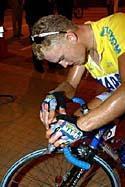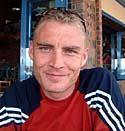
Recently on Cyclingnews.com |
An interview with Robert Hunter, November 28, 2003
Refocusing after a bad hunting season
Robert Hunter has put South Africa on the map of world cycling when he became the first rider from his country to take part in the Tour de France with Lampre in 2001. Now with Rabobank, the sprinter from the West Rand sets his sight on 2004 Spring classics after a very unsuccessful season, as Jean-Francois Quenet finds out.
Cyclingnews.com: Robert, tell us what it is to have a "shit" year?
Robert Hunter: It puts everything into perspective. It makes you readjust your goals and the way you see cycling. When you do well all the time, you've got this feeling that cycling is easy, but it's not. The whole thing can end up very quickly if you don't dedicate yourself 100 percent.
CN: So, what happened in 2003?
RH: It first happened with a broken hand while I was training in South Africa in January. It delayed my preparation. At the classics, I was one step behind so I put myself at the disposition of the team. I helped, that was all I could do. Then I came back in South Africa and I trained really hard for the Tour de France. It worked. I came back to form and I finished fourth in my first race after that break, the Tour of Picardy. I thought I was on schedule. But at the Bicicleta Vasca I crashed again and injured my coccyx. It was very painful. I was off the bike for a week and half. For sure that wasn't the ideal preparation for the Tour de France. I am type of rider who needs a lot of racing and I didn't have enough of racing condition.
CN: However you had high ambitions on the start line of the Tour de France in Paris.
RH: Yes but I was unprepared and I was riding all the time for Oscar. By the end of the second week, there was nothing left in me. My body wasn't recovering, my heart rate couldn't go higher than 160bpm.
CN: What did you do then?
RH: I went home and rested before I resumed training slightly. The plan was to head back to Europe to race again at the Tour of Denmark towards the World's. Once again I set goals and I thought I was on the right schedule. I was also very motivated for the Tour of Holland where I had done well in the past. But once again I had a crash in Denmark and I broke my wrist. It was pretty much where my season ended. At the very end I took part in smaller races in Italy and Belgium but above all I wanted to put the whole season behind me.
CN: How was your new team, Rabobank, with you during these hard times?
RH: Very good. The team has always been behind me. The staff was always there to help me at the fullest. Rabobank is one of the biggest teams in the world, they want results, it's logical that they put pressure on, but they have done it in a good way towards me even when I had problems. Never once would they have told me "we pay you this much and you don't bring results". They were also aware that I'm a rider who puts a lot of pressure on himself. They know that I am professional enough to dedicate myself 100 percent for next year.

|
CN: How do you see the 2004 season?
RH: I would have loved to ride Le Tour de Langkawi in Malaysia again [he got 3 stage wins, wore the yellow jersey for almost all the race and finished 6th overall in 2002, ed.] but it's not on Rabobank's program and the team isn't keen that I'd do it with the South African National team, which is now directed by my local manager Tony Harding. So I'll probably start in Qatar, which is a profitable transition after a solid base of training done in South Africa. It's better than hurting my body from the hot climate I have at home to the cold conditions of Europe when the season starts there.
CN: Where do you train in South Africa?
RH: I have two favourite places where I'll go in December and January: Crystal Springs at the top of the Robberpass in the Mpumalanga province, it's a 10km climb so I have no choice for the route when I come back from training, the other one is Nelspruit right near the famous Kruger National park where I have the choice between flat and hilly roads. But don't worry, I don't ride my bike in the middle of the animals, I don't want to meet a bunch of lions while training.
" A lot of world cup races suit me. Even in San Sebastian I have the potential to win. " |
CN: What do you have in mind to motivate yourself when you go training?
RH: I say to myself: my contract will end next year and I can't afford another bad season. Cycling is where I earn my living and I want to carry on. It would be stupid to throw away all the sacrifices I've made in the past few years to become the rider I am now. I always think of another South African who had the talent to succeed, Kosie Loubser. Now he has quit cycling. As for myself, I don't want to be regretting anything at the end of my career. That's why the classics are what I'm dedicating myself to at for the moment.
CN: What will be your major goal next year?
RH: I want a major result in Paris-Roubaix. But I know it's a temperamental race, the course or the weather conditions can break your ambitions down. The classics are my first goal. For now, I don't want to think any further. Then I'll hope to ride my fourth Tour de France and win a stage.
CN: Have you had a look at the route?
RH: Yes! And I love it. It'll be a hard attacking race. Many riders will try to go away anytime, that's what I like: be a part of the action. I am a sprinter but after five years as a pro I know that I'm not as fast as the pure sprinters. Quite often I've been a helper for one of them riding in my team [Jan Svorada at Lampre, Tom Steels or Oscar Freire at Mapei, Freire again at Rabobank, ed.], so I am a factor in a bunch sprint. For example, Stuart O'Grady is slower than I am but he is a factor in the sprints because of the way he considers himself. I know how good I can be. I know what type of results I can get, not only in the bunch sprints, also with my aggressive style of racing. A lot of world cup races suit me. Even in San Sebastian I have the potential to win. With good condition I can climb well and make the first group.

|
CN: To finish with, your teammate Oscar Freire visited you recently in South Africa. Are you a tour guide for the off-season?
RH: No, Oscar did most of the visits by himself. He also went to Botswana, Zambia and Zimbabwe. When he joined me in South Africa, he couldn't believe how this country was. He loved it. I'm not a tour guide but I often encourage professional bike riders to come here, either for training or for holidays. Jan Ullrich, Mario Cipollini and a few other Germans and Italians will be back near Cape Town in December. Pedro Horrillo came for his honeymoon.
I want to be an ambassador for my country. It's only 10 hours away from Europe on a night flight, there's no jet lag, the next day you're able to train or live normally. A young Estonian Tarmo Raudsepp came here for racing after the European season and he also had a great time. South Africa has a lot to offer and it's not an African country where you can get the malaria, nothing. It's a great place, I love it and I enjoy sharing this passion with my cyclist friends.
See also: 2002 Robert Hunter interview
Other Talking Cycling Interviews

